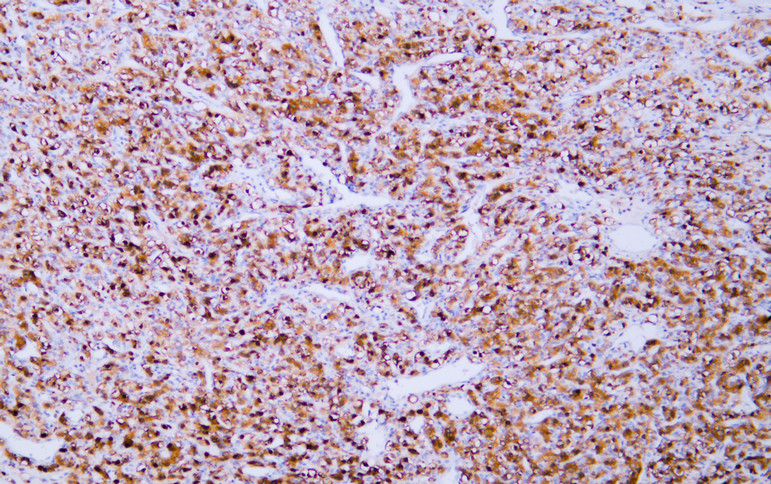S100A1 (PT1428) mouse mAb (Ready to Use)
- Catalog No.:YM6223R
- Applications:IHC
- Reactivity:Human;Mouse;Rat;
- Target:
- S100A1
- Gene Name:
- S100A1 S100A
- Protein Name:
- S100A1
- Human Gene Id:
- 6271
- Human Swiss Prot No:
- P23297
- Immunogen:
- Synthesized peptide derived from human S100A1 AA range: 1-50
- Specificity:
- The antibody can specifically recognize human S100A1 protein, and has no cross reaction with S100A4 or S100A6.
- Formulation:
- The prediluted ready-to-use antibody is diluted in phosphate buffer saline containing stabilizing protein and 0.05% Proclin 300
- Source:
- Mouse, Monoclonal/IgG1, kappa
- Dilution:
- Ready to use for IHC
- Purification:
- The antibody was affinity-purified from ascites by affinity-chromatography using specific immunogen.
- Storage Stability:
- 2°C to 8°C/1 year
- Other Name:
- Protein S100-A1 (S-100 protein alpha chain;S-100 protein subunit alpha;S100 calcium-binding protein A1)
- Background:
- S100 calcium binding protein A1(S100A1) Homo sapiens The protein encoded by this gene is a member of the S100 family of proteins containing 2 EF-hand calcium-binding motifs. S100 proteins are localized in the cytoplasm and/or nucleus of a wide range of cells, and involved in the regulation of a number of cellular processes such as cell cycle progression and differentiation. S100 genes include at least 13 members which are located as a cluster on chromosome 1q21. This protein may function in stimulation of Ca2+-induced Ca2+ release, inhibition of microtubule assembly, and inhibition of protein kinase C-mediated phosphorylation. Reduced expression of this protein has been implicated in cardiomyopathies. [provided by RefSeq, Jul 2008],
- Function:
- function:Weakly binds calcium but binds zinc very tightly-distinct binding sites with different affinities exist for both ions on each monomer. Physiological concentrations of potassium ion antagonize the binding of both divalent cations, especially affecting high-affinity calcium-binding sites.,similarity:Belongs to the S-100 family.,similarity:Contains 2 EF-hand domains.,subunit:Dimer of either two alpha chains, or two beta chains, or one alpha and one beta chain.,tissue specificity:Highly prevalent in heart. Also found in lesser quantities in skeletal muscle and brain.,
- Subcellular Location:
- Nuclear, Cytoplasmic
- Expression:
- Highly prevalent in heart (PubMed:12804600, PubMed:1384693). Also found in lesser quantities in skeletal muscle and brain (PubMed:1384693).
- June 19-2018
- WESTERN IMMUNOBLOTTING PROTOCOL
- June 19-2018
- IMMUNOHISTOCHEMISTRY-PARAFFIN PROTOCOL
- June 19-2018
- IMMUNOFLUORESCENCE PROTOCOL
- September 08-2020
- FLOW-CYTOMEYRT-PROTOCOL
- May 20-2022
- Cell-Based ELISA│解您多样本WB检测之困扰
- July 13-2018
- CELL-BASED-ELISA-PROTOCOL-FOR-ACETYL-PROTEIN
- July 13-2018
- CELL-BASED-ELISA-PROTOCOL-FOR-PHOSPHO-PROTEIN
- July 13-2018
- Antibody-FAQs
- Products Images

- Human kidney tissue was stained with anti-S100A1 (PT1428) Antibody

- Human renal clear cell carcinoma tissue was stained with anti-S100A1 (PT1428) Antibody

- Human tonsil tissue was stained with anti-S100A1 (PT1428) Antibody

- Human kidney tissue was stained with anti-S100A1 (PT1428) Antibody

- Human renal clear cell carcinoma tissue was stained with anti-S100A1 (PT1428) Antibody

- Human tonsil tissue was stained with anti-S100A1 (PT1428) Antibody

